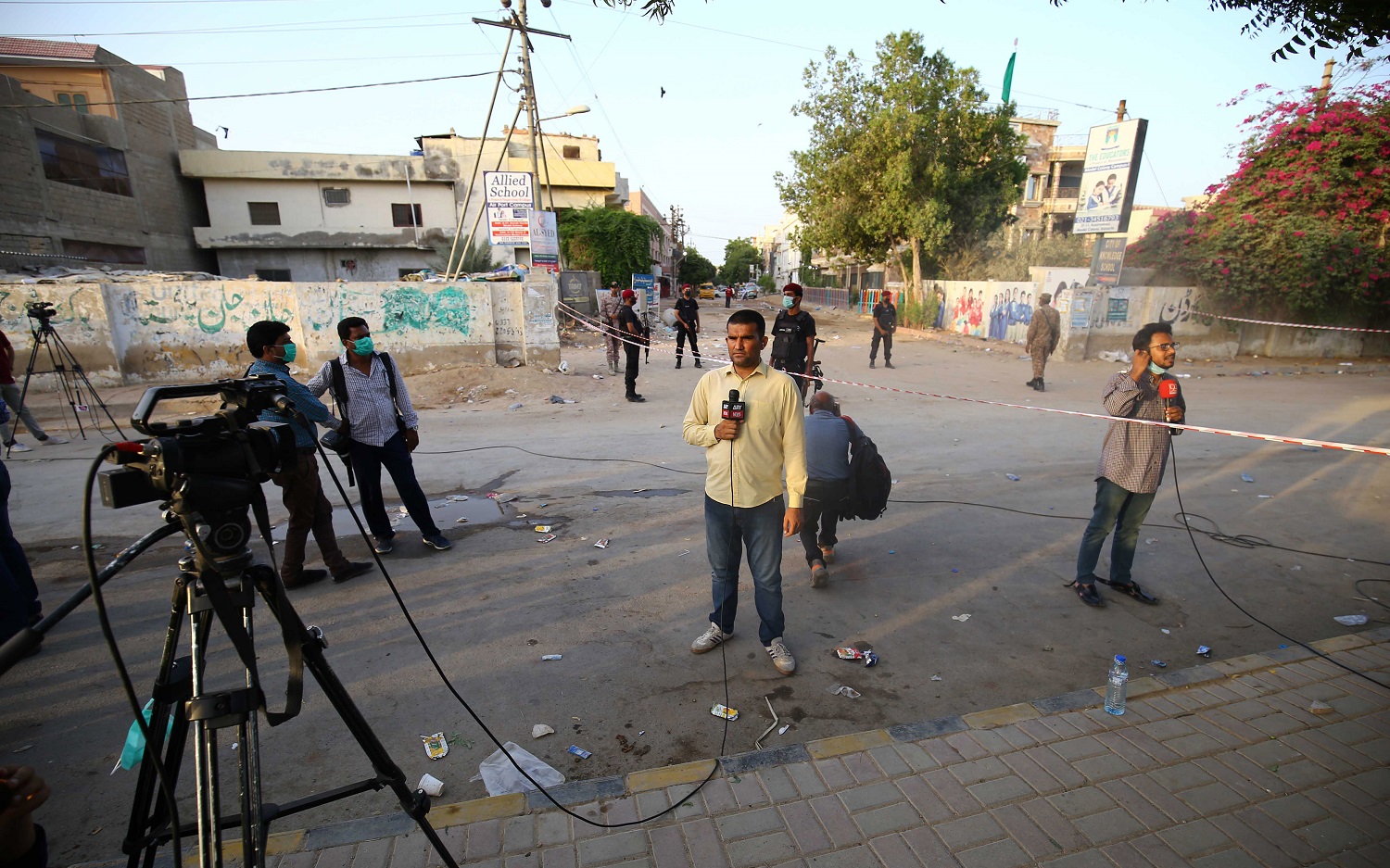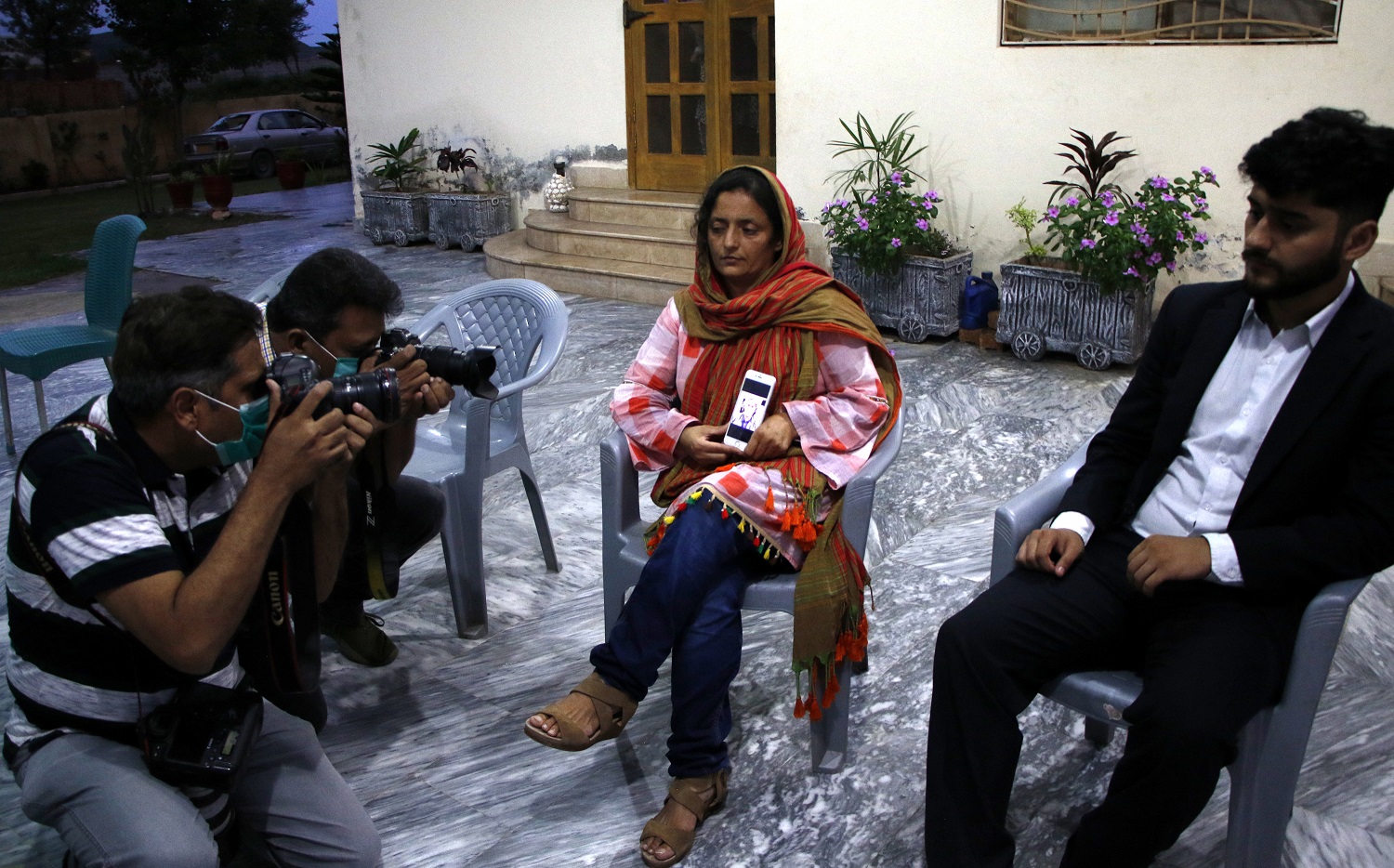تحتاج باكستان إلى المزيد من الوقت كي تحقق التحوّل المطلوب في مجال الصحافة الرقمية، لكنها على الطريق الصحيح. هذا ما تعتقده فاطمة شودري مؤسِّسة موقع "ذي كارانت" (The Current)، إذ ترى أن "الفهم يترسّخ تدريجيًّا في باكستان بأن الصحافة الرقمية لها ديناميكيات عمل مختلفة".
تأسس موقع "ذي كارانت" الباكستاني يوم 23 مارس/آذار 2019، وأشرف عليه كلّ من فاطمة شودري ومحمال صارفراز، وهما صحفيان عملا في الصحافة التقليدية، ولهما خبرة ممتدة لسنوات في وسائل الإعلام المختلفة.
قررت فاطمة ومحمال اكتشاف مجال الإعلام الجديد والدخول إلى عالم الصحافة الرقمية، إدراكًا منهما لأهمية ذلك. وهكذا ولد موقع "ذي كارانت"، وقد ترك منذ انطلاقته بصمة في المشهد الإعلامي الباكستاني، عبر مزجه بين الأخبار التي يتم تناولها بطريقة جدية، مع جانب الترفيه والقصص الصحفية المصوّرة في مواضيع طريفة تهمّ الشباب.
استثمرت فاطمة مدخرات حياتها في هذا المشروع، وبدأت مع فريق صغير من الصحفيين الشباب هذه الرحلة الجديدة في عالم الصحافة الرقمية.
تقول: "لحسن حظي، كان الفريق صغيرًا ولكنه ذو كفاءة عالية، ففيه صحفيون شباب يحبون العمل الذي يقومون به.. لم نكن نتحمل الكثير من التكاليف الشهرية مثل مؤسسات إعلامية أخرى، وحققنا بعض الدخل عبر إعلانات الجهات الراعية ومقاطع الفيديو على يوتيوب والإعلانات على غوغل".
وترى أن معظم المواقع الإلكترونية التي تقدم المحتوى تكون عادة تابعة لوسائل إعلامية أخرى، وليست في الأصل منصة رقمية، مما يعني أنه لا يمكن اعتبارها صحافة رقمية، أو ليست الصحافة الرقمية المطلوبة على الأقل.
وعن تأثير جائحة "كوفيد-19" على العمل، لا تنفي فاطمة أنّه كان سيئا، وذلك لاضطرار الفريق إلى متابعة العمل من البيت في البداية، وهو ما انعكس سلبًا على إنتاج بعض أشكال المحتوى الذي كان يدرّ دخلا للموقع. كما أن تأثير الجائحة سيحدّ من سرعة التحوّل الرقمي، تبعًا لارتباط الأخير بالتطور الاقتصادي الذي تأثر هو أيضا سلبا بكورونا.
أما على صعيد تأسيس الشركات الناشئة في باكستان قبل الجائحة وبعدها، فتقول فاطمة: "لقد أتت انطلاقتنا في وقت صعب، ونجحنا في تحقيق نوع من التأقلم مع الوضع الراهن، ولكني لا أعتقد أن الجميع قادر على تحقيق ذلك، وسيحجم كثيرون عن تأسيس شركات ناشئة في هذه الظروف، ولاسيما في المنصات الرقمية. لستُ متأكدة إن كانت المنصات الرقمية ستكون هي السائدة فيما بعد، ولكني أعتقد أن معظم الناس لا يزالون يعتمدون على التلفاز لمعرفة الأخبار".
لكنها تشير في المقابل إلى أن الموقع كسب ما يكفي من الإيرادات عبر محتوى الفيديو على يوتيوب، مثل برنامج "مقابلات الأحد"، إذ وصفته بأنه مصدر الدخل الأساسي الذي يقوم عليه الموقع. لكن الآن وفي ظل الركود الاقتصادي الحاصل، فإن إيرادات الموقع تراجعت، ولم تعد مقاطع الفيديو تحقق إيرادات كما كانت في السابق.
وبالإضافة إلى مشروعهما الجديد الذي أحدث نقلة نوعية في المشهد الإعلامي الباكستاني، فإن فاطمة ومحمال حققا إنجازات كثيرة في غضون عام واحد على إطلاق هذا الموقع الناشئ، ولديهما طموحات كبيرة يسعيان إلى تحقيقها في الفترة المقبلة. تقول فاطمة معبرة عن فخرها بهذا الإنجاز: "موقع ذي كارانت هو المنصة الرقمية الإخبارية الوحيدة في باكستان التي حصلت على منحة مبادرة أخبار غوغل، ونحن نتلقى الدعم منهم حاليا لإنشاء أول نموذج للاشتراكات في باكستان والذي سيتم اعتماده في الموقع خلال عام تقريبًا. كما حصل الموقع على دعم من مبادرة "سبلايس لايتس أون" (Splice Lights On)".
وأكدت فاطمة على الفروق بين التلفاز والمنصات الرقمية، خاصة على صعيد الجمهور، قائلة إن "للمنصات الرقمية نوعًا جديدًا من الجمهور، فهي تستهدف أفراد جيل الألفية الذين يقضون أوقاتًا طويلة على هواتفهم ولا يجلسون أمام التلفاز كثيرًا، وتجذبهم القصص المختصرة ومقاطع الفيديو القصيرة، أي المحتوى الذي يحافظ على الجانب التفاعلي ويضمن التنوّع. فالشباب يحصلون على الأخبار عبر الإنترنت، وجائحة كوفيد-19 قد أثرت بالفعل على أنماط سلوكهم، فصاروا أكثر اهتمامًا بمتابعة الأخبار والتطورات، إلى جانب اهتمامهم الأساسي بمتابعة المحتوى الترفيهي. وهذا ما يدفع إلى التفكير في إنشاء المزيد من المنصات الخاصة بالمحتوى الترفيهي في مقابل المنصات الخاصة بالشؤون السياسية".
ويبدو أن عددًا آخر من الصحفيين الشباب في باكستان لديهم اهتمام بالتحول نحو المنصات الرقمية، والاهتمام بشكل أكبر بالجمهور الواسع لهذه المنصات من الشباب عبر تقديم محتوى قصير وممتع يمكن متابعته عبر الأجهزة المحمولة.
ثمة بعض الصحفيين المخضرمين أيضًا من الذين يؤمنون بأهمية التحول نحو الصحافة الرقمية، وقد صار لهم حضور شخصي على منصات يوتيوب وفيسبوك، إذ وجدوا أن هذه المنصات تمنحهم قدرًا أكبر من الحرية في ممارسة العمل الصحفي بالشكل الذي يرغبون فيه، وهي تجربة فريدة لم يسبق أن أتيحت لهم من قبل في وسائل الإعلام التقليدية.
أحد هؤلاء الصحفيين من كراتشي -وقد فضّل عدم ذكر اسمه- أخبرني بأنه اختبر شعور الحريّة أثناء العمل في المنصات الرقمية بعد أن ترك العمل مع وسائل الإعلام التقليدية، وبدأ الكتابة لبعض المواقع الرقمية الناشئة التي صار لها عدد كبير من المتابعين في غضون فترة قصيرة.

"تساعدني المنصات الرقمية على نشر قصصي الصحفية بشكل أسرع، كما أنها تصل إلى عدد أكبر من الناس في فترة قصيرة، وهذا أمر مثير بالنسبة إلي. لقد عملت في الصحافة طوال 20 عامًا، ولكنّي لم أشعر من قبل بأنني قادر على الوصول إلى هذا القدر من القراء وبهذه السرعة".
كما أخبرني بكونه معجبا بأن المشرفين على هذه المنصات الرقمية هم صحفيون شباب، وهو ما عزز شعوره بالحرية والقدرة على التعبير عن نفسه بعيدًا عن القيود التقليدية.
"لستُ مضطرًا الآن للانتظار يومًا كاملا لأحظى بتعليق من المحرر المسؤول بشأن ما كتبت، لأن المنصات الرقمية تتيح نشر قصتك الصحفية في وقت أسرع، مما يسمح لك بالتركيز على قصتك الصحفية التالية". ويضيف أن "الكثير من القضايا تحدث في باكستان، وهذه المنصّات الرقميّة هي المكان الأنسب لمتابعتها وتغطيتها"، وهو ما دفعه وعددا من الزملاء إلى التفكير في إنشاء موقع إلكتروني جديد لتغطية القصص الصحفية التي تهملها الصحافة التقليدية. "يمكن أن نرفع مقطع فيديو، أو ننشر مقال رأي، أو تقريرا صحفيا، أو مقالا مطولا، وهذا القدر من الحرية والمرونة مذهل جدًا، خاصة أننا في بيئة صعبة معتادة على الرقابة الذاتية. لو كانت هذه المنصات الرقمية متوفرة أثناء الحكم الدكتاتوري في السبعينيات والثمانينيات، لكان يمكن عبرَها أن نغيّر تاريخ الصحافة في باكستان".
أحمد علي رجل أعمال يتولى منذ 18 شهرا تطوير شركة ناشئة جديدة في الإعلام الرقمي في باكستان. وكان من المزمع إطلاق هذا المشروع مطلع العام الجاري، ولكن تم تأجيل ذلك بسبب جائحة "كوفيد-19". فكّر أحمد بداية في التخلي عن المشروع، ولكن مع تحسّن الأرقام في القطاع الرقميّ بدا أن المشروع لا يزال واعدًا بالنجاح، وقرر أن يستأنف العمل من أجل إطلاقه قريبًا.
يقول أحمد: "لقد شكّل تردّي الوضع الاقتصادي تحديًا كبيرًا منذ مطلع العام، وقد طلب مني المستثمرون تأجيل المشروع حتى يتسنّى لهم تقييم السوق. وبعد فترة قصيرة، ومع تواصل بقاء الناس في المنازل بسبب الجائحة، تزايد الإقبال على الإنترنت والمنصات الإلكترونية، وهذا ما شجعنا على استئناف العمل لإطلاق المشروع، ونأمل أن نتمكن من ذلك قريبًا جدًّا".
وقد أدت المشاكل الاقتصادية التي تعاني منها باكستان في السنوات الأخيرة إلى التأثير على العاملين في المؤسسات الإعلامية، حيث تم تسريح الكثير منهم، أو خفض رواتبهم بشكل كبير، الأمر الذي دفع العديد من العاملين في هذا القطاع إلى البحث عن فرص مهنية في مجالات أخرى. لكن الفرصة مع ذلك ما تزال سانحة للتحوّل التدريجي إلى الإعلام الرقمي.
بدورها، تكتب غزالة سليمان في موقع "هيب إن باكستان"، بعد أن شغلت سابقاً منصب سكرتيرة التحرير في موقع "براندسيناريو"، وكتبت لسنوات في مجال الإعلام الرقمي.
وتقول إن تغيرًا كبيرًا قد طرأ على الجمهور، كما أن الإعلام الرقمي منح الصحفيين جميعًا -المخضرمين منهم والمبتدئين- مساحة واسعة من الفرص لنشر محتوى ذي جودة عالية والوصول إلى جماهير أوسع. وأضافت غزالة أن جائحة "كوفيد-19" أقنعت الكثيرين بأن الإعلام الرقمي هو المستقبل، بالنظر إلى مدى تأثيره وسرعة وصوله.
"الكثير من التغييرات تطرأ وبسرعة في العالم الرقمي. إليك مثلا منصة تيك توك التي صار لها حضور واسع جدًّا بين الباكستانيين، ومنصة إنستغرام التي صارت إحدى المنصات المفضلة للتعليم.. إنها ظاهرة جديرة بالاهتمام، وذلك لأن المنصات الرقمية تقدم الأخبار والترفيه والنصائح والدورات التدريبية، وهو ما يجعل منها تجربة مذهلة بحق".
في المقابل، تعتقد غزالة أن ثمة مسائل لا بدّ من التنبه إليها بخصوص المحتوى الذي توفره المنصات الرقمية، وتؤكّد على ضرورة وضع معايير للحفاظ على جودة المحتوى وضمان أن يتمتع العاملون في هذا المجال بالمسؤولية. كما قالت إنه لا بدّ من وضع بعض المعايير والاتفاق عليها، ودراسة المعايير والقوانين والأنظمة المعمول بها في دول أخرى.
لقد دخلت باكستان في عصر الشركات الرقمية الناشئة بالفعل، ومن شأن ذلك أن يغير مستقبل الصحافة وطريقة التعاطي معها في البلاد عبر السنوات المقبلة. ومن المأمول أن يسهم هذا التحول في جعل العمل الصحفي أكثر حرية وتأثيرًا في المجتمع.








































